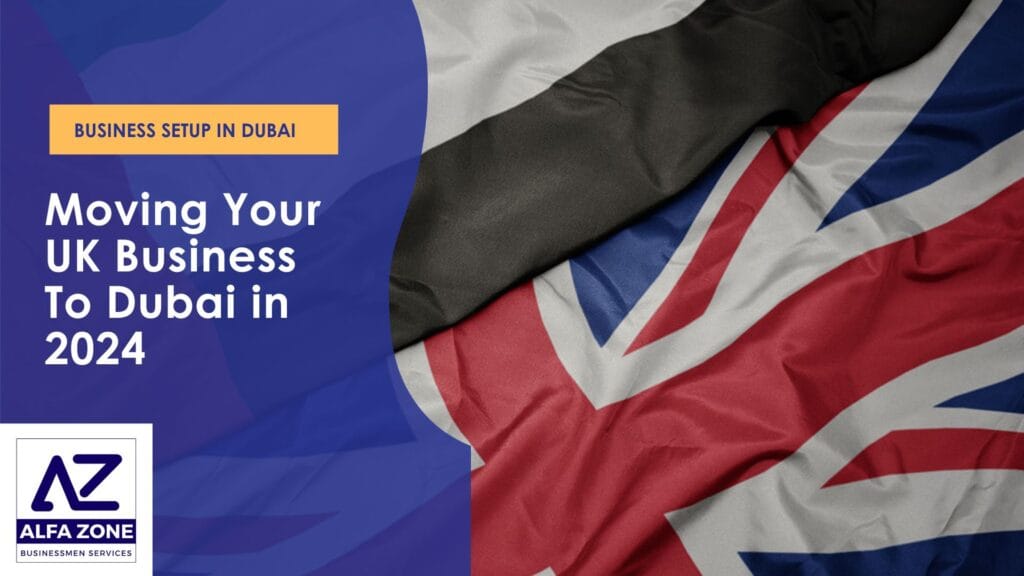Everything You Need To Know About Moving Your UK Business To Dubai in 2024
In recent years, Dubai has become a global business hub that attracts entrepreneurs and corporations alike. The city’s strategic location, tax benefits, and business-friendly environment make it an ideal destination for companies looking to expand internationally. If you’re considering moving your UK business to Dubai, this comprehensive guide covers everything you need to know about the process of relocating your UK business to Dubai and the UAE, from understanding the business setup process to navigating legal requirements and taking advantage of Dubai’s business infrastructure.
Table of Contents
ToggleIn this detailed guide, we will walk you through the steps to move your UK company to Dubai, why Dubai is an excellent destination for both small businesses and multinational businesses, and the key factors you should consider to make this transition smooth and successful. With Dubai offering various options, from Free Zone company formation to Mainland company setup, there are plenty of opportunities to establish or relocate your business in this dynamic city.
If you’ve been asking questions like “How do I move my UK company to Dubai?” or “Can I setup my UK company in Dubai?”, read on. This article is packed with information designed to help you plan and execute your business relocation effectively, whether you’re a small entrepreneur or managing a large corporation. You will also find useful information about business structures, tax incentives, legal regulations, and the overall company setup process in Dubai.
Check Out Our Easy Online Business Cost Calculator
Why Dubai? The Appeal for UK Businesses
Dubai offers several strategic advantages that make it an appealing destination for UK businesses. Here’s why companies from the UK are flocking to this business haven:
1. Zero Income and Corporate Taxes
One of the primary reasons businesses are moving to Dubai from the UK is the city’s favorable tax policies. Dubai has no personal income tax and does not impose corporate taxes on most businesses, making it highly attractive for businesses of all sizes. Moving your UK business to Dubai allows you to retain more profits, which can be reinvested in business growth or distributed to shareholders.
The absence of taxes also means that employees who relocate with the company to Dubai benefit from tax-free salaries. This is a significant incentive for companies looking to retain top talent when relocating operations abroad.
Also Read: Minimum Investment to Start a Business in Dubai in 2024
2. Prime Location for Global Trade
Situated at the crossroads of Europe, Africa, and Asia, Dubai is a critical hub for international trade. This prime location makes it ideal for companies that are looking to expand their footprint across various global markets. By relocating your UK-based business to Dubai, you can capitalize on the UAE’s role as a logistical hub for international shipping and trade, facilitating easier access to neighboring regions and emerging markets.
3. World-Class Infrastructure
When moving your UK business to Dubai, you can take advantage of Dubai’s world-class infrastructure. The city is home to state-of-the-art logistics, transportation networks, telecommunications, and a robust financial sector that supports businesses of all scales.
In addition to infrastructure, Dubai offers a business-friendly regulatory environment. Whether you are establishing a Free Zone company or a Mainland company, the UAE government has created a streamlined process to support entrepreneurs and corporations alike. The regulatory framework in Dubai is transparent, efficient, and encourages foreign investment.
4. 100% Foreign Ownership in Free Zones
One of the major advantages of setting up in one of Dubai’s Free Zones is the ability to retain 100% foreign ownership. Unlike Mainland companies, where local sponsorship (an Emirati national owning 51% of the company) is traditionally required, Free Zone companies allow for full ownership by the foreign investor. This is ideal for businesses that don’t require direct trade within the UAE market and prefer to focus on international trade and services.
Check Out Our Easy Online Business Cost Calculator
5. Diverse Business Opportunities
Dubai’s economy is incredibly diverse, offering opportunities in sectors such as technology, finance, healthcare, real estate, and tourism. The city is known for welcoming innovation and is continually evolving to accommodate industries of the future, such as artificial intelligence (AI), blockchain, and fintech. When expanding your UK business to the UAE, you will find that Dubai provides numerous incentives and support mechanisms for industries that are driving economic diversification.
Understanding Business Structures in Dubai
When relocating your UK business to Dubai, it is crucial to understand the various business structures available. Depending on the nature of your business and your operational goals, you can choose from several options:
1. Free Zone Companies in UAE
Setting up a Free Zone company is often the preferred route for foreign businesses, especially those focused on international trade or consultancy services. Each Free Zone is a designated area that caters to specific industries, offering a wide range of benefits to foreign investors. These include:
- 100% foreign ownership: Free Zone companies allow foreign investors to own the entire company, without needing a local sponsor.
- Tax exemptions: Businesses operating in Free Zones are exempt from customs duties and corporate taxes.
- No currency restrictions: Free Zones allow free repatriation of profits and capital.
- Simplified visa and immigration processes: Setting up in a Free Zone can make it easier to obtain visas for yourself and your employees.
Popular Free Zones include the Dubai Multi Commodities Centre (DMCC), Jebel Ali Free Zone (JAFZA), Dubai Airport Free Zone (DAFZA), and Dubai Internet City (DIC). Each Free Zone caters to specific industries, so you can choose one that aligns with your business activities.
Steps to Setting Up a Free Zone Company:
- Select a Free Zone based on your business activity.
- Choose your company name and ensure it complies with UAE regulations.
- Apply for a business license specific to your industry.
- Secure office space within the Free Zone (options range from flexi desks to full offices).
- Open a corporate bank account in Dubai.
- Apply for visas for yourself and your employees.
Also Read: Get a Grocery Store License in Meydan Free Zone Dubai
2. Dubai Mainland Companies
Unlike Free Zone companies, Mainland companies can trade directly within the local UAE market. While the traditional setup required a local sponsor to hold 51% of the business, recent reforms now allow 100% foreign ownership in certain sectors. Mainland companies are ideal for businesses that want to conduct business within Dubai and the UAE, as well as participate in government contracts and large-scale infrastructure projects.
Mainland companies are regulated by the Dubai Department of Economic Development (DED), and they are not restricted by geographic location within the city, giving businesses flexibility when it comes to office space and operational scope.
Steps to Setting Up a Mainland Company:
- Choose a local sponsor (for certain sectors) or apply for 100% ownership in permitted sectors.
- Select your business activity and obtain initial approval from the DED.
- Register your trade name with the DED.
- Apply for the relevant business license (commercial, industrial, or professional).
- Lease office space in Dubai.
- Submit your business license application to the DED.
- Open a corporate bank account.
Also Read: Dubai Mainland Business Setup
3. Offshore Companies
Offshore companies in Dubai are primarily used for holding assets, conducting international trade, or securing tax advantages. These companies are registered within Dubai but are not permitted to conduct business within the UAE. Offshore companies offer benefits such as tax optimization, asset protection, and confidentiality, making them ideal for investors looking to diversify their portfolio or safeguard their assets.
Common jurisdictions for offshore company formation include JAFZA and the Ras Al Khaimah International Corporate Centre (RAKICC). These companies are regulated differently from Mainland and Free Zone businesses, and they are often used for holding investments, intellectual property, and real estate.

Business Setup Process in Dubai: A Step-by-Step Guide
The company setup process in Dubai is designed to be efficient and streamlined, but there are several steps you need to follow to ensure compliance with local regulations. Whether you are setting up a business in Dubai from the UK or relocating an existing business, understanding the process will help you navigate the transition smoothly.
Also Read: Set Up a Business in Dubai and the UAE (2024)
Step 1: Determine Your Business Structure and Jurisdiction
The first step in moving your UK business to Dubai is to decide on the type of business structure you want to establish. As discussed, this could be a Mainland company, a Free Zone company, or an offshore company. Your choice will depend on factors such as your business activity, market access requirements, and whether you need local sponsorship.
Once you have chosen your business structure, select the appropriate jurisdiction. Dubai offers over 30 Free Zones, each catering to specific industries and offering tailored benefits. If you plan to operate locally and engage with the UAE market, a Mainland company might be the better choice.
Check Out Our Easy Online Business Cost Calculator
Step 2: Choose Your Business Activity
Selecting the right business activity is crucial, as it will determine the type of business license you need. Dubai’s Department of Economic Development (DED) categorizes activities into three main types:
- Commercial activities: For businesses engaged in trading goods and services.
- Industrial activities: For manufacturing or industrial businesses.
- Professional activities: For service providers, consultants, and professionals.
Ensure that your chosen business activity aligns with your business goals, as this will influence your regulatory and compliance requirements.
Step 3: Register Your Trade Name
Once you have decided on your business structure and activity, the next step is to register your company’s trade name. The trade name must comply with UAE naming conventions and should not contain any offensive or religious terms. The name should also not duplicate any existing registered company in Dubai.
Step 4: Submit a Business License Application
The business license is a critical document that allows you to operate legally in Dubai. Depending on your chosen business activity, you will apply for one of the following types of licenses:
- Commercial license: For trading businesses.
- Industrial license: For manufacturing or industrial companies.
- Professional license: For service providers and consultants.
You can submit your business license application to the Dubai Department of Economic Development (DED) for Mainland companies or to the relevant Free Zone authority for Free Zone companies.
Step 5: Lease Office Space
Dubai requires all businesses to have a physical address. Depending on your company type, you will need to lease office space, whether in a Free Zone or in the Mainland. Free Zones typically offer flexible office solutions such as flexi-desks, coworking spaces, and full-service office suites.
Also Read: What is a Flexi Desk in Dubai, Its Costs & Benefits
Step 6: Open a Corporate Bank Account
Opening a corporate bank account is essential for conducting business in Dubai. Most banks in the UAE require companies to submit their trade license, memorandum of association, and passport copies of shareholders and directors. The process typically takes 2-3 weeks, but the UAE offers a wide range of banking options, including international and local banks.
Step 7: Obtain Visas for Yourself and Employees
As part of the company setup process in Dubai, you will need to apply for visas for yourself and your employees. Dubai offers various visa options, including investor visas, employment visas, and long-term residence visas for entrepreneurs. Free Zones typically simplify the visa process for companies registered within their jurisdiction.
Step 8: Comply with Local Regulations and Obtain Approvals
Once your business is established, ensure compliance with all local laws and regulations, including labor laws, data protection laws, and health and safety regulations. Depending on your business activity, you may need additional approvals from relevant government authorities or industry regulators.

Navigating Legal and Regulatory Requirements
While moving a UK business to Dubai is relatively straightforward, there are several legal and regulatory requirements that you should be aware of:
1. Sponsorship and Local Partner Requirements
In the past, Mainland companies in Dubai required a local sponsor (an Emirati national) to own 51% of the business. However, recent reforms have relaxed these requirements in certain sectors, allowing 100% foreign ownership. It’s essential to check whether your industry allows for 100% ownership or if you still need a local partner.
2. Tax Residency and Corporate Taxation
Although Dubai is a tax-free environment for most businesses, recent changes have introduced a 9% corporate tax for companies generating more than AED 375,000 in profits. However, there is no personal income tax in the UAE, which is a significant draw for businesses and their employees. To obtain tax residency status in Dubai, you will need to demonstrate that you meet certain residency criteria.
3. Free Zone vs. Mainland Regulations
Businesses in Free Zones enjoy unique benefits such as 100% foreign ownership, tax exemptions, and simplified procedures for importing and exporting goods. However, they are restricted from trading directly within the UAE market unless they partner with a local distributor. Mainland companies, on the other hand, can freely trade within the UAE but are subject to local regulations and requirements.
4. Employment Laws and Labor Contracts
Dubai follows the UAE’s Federal Law No. 8 of 1980, which governs employment and labor relations. When relocating your UK business to Dubai, ensure that you are compliant with these labor laws, including offering employees fixed-term contracts, providing end-of-service benefits, and adhering to working hour regulations.
5. Data Protection and Cybersecurity
Dubai has introduced data protection laws modeled on the European General Data Protection Regulation (GDPR). When moving your business to Dubai, ensure compliance with these regulations to protect customer data and avoid hefty fines.
Check Out Our Easy Online Business Cost Calculator
Tax Benefits of Relocating Your Business to Dubai
One of the primary reasons why businesses from the UK are moving to Dubai is the tax advantages. Here are the main tax benefits:
1. Zero Corporate Tax
Dubai does not impose corporate tax on most businesses, making it a favorable destination for companies looking to maximize profits. This is a significant advantage compared to the UK, where corporate tax rates can be as high as 25%.
2. No Personal Income Tax
In addition to zero corporate tax, Dubai has no personal income tax. This is a major incentive for both business owners and employees relocating to Dubai, as they can earn tax-free income, resulting in significant savings compared to the UK.
3. Tax-Free Repatriation of Profits
Dubai allows businesses to repatriate their profits back to their home country tax-free. This is particularly beneficial for companies that are expanding their UK business to the UAE and want to send profits back to their UK headquarters.
4. VAT at 5%
The UAE has a relatively low VAT rate of 5%, which applies to most goods and services. This is significantly lower than the UK’s 20% VAT rate, making Dubai an attractive destination for businesses looking to minimize their tax liabilities.
Choosing the Right Professional Business Consultant
Relocating a business to a new country can be complex, but working with a professional business consultant can simplify the process and ensure compliance with local regulations. A consultant can assist you in the following areas:
1. Business Setup Consultation
A business setup consultant can help you navigate the different business structures available in Dubai, such as Free Zone or Mainland company setups. They will assess your business goals and advise you on the best structure for your needs.
2. Licensing and Regulatory Compliance
A consultant will assist you in obtaining the necessary licenses and ensuring that your business complies with all UAE regulations. They will also help you navigate the legal requirements for forming a company in Dubai, such as drafting the memorandum of association and registering your trade name.
3. Visa and Immigration Services
A business consultant can guide you through the visa and residency application process, ensuring that you and your employees can legally live and work in Dubai.
4. Banking and Financial Services
Opening a corporate bank account in Dubai can be a complex process, but a consultant can assist you in selecting the right bank, preparing the necessary documentation, and managing the account setup process.
Life in Dubai: A New Home for UK Business Owners
In addition to the business benefits, Dubai offers a high quality of life for expatriates. When relocating to Dubai from the UK, you will experience a cosmopolitan lifestyle with access to world-class healthcare, education, and entertainment options.
1. Housing and Real Estate
Dubai offers a wide range of housing options, from luxurious villas to modern apartments in high-rise buildings. Many expatriates choose to live in areas like Dubai Marina, Downtown Dubai, and Palm Jumeirah, which offer easy access to business districts and amenities.
2. Healthcare and Education
Dubai is home to some of the best hospitals and clinics in the region, offering high-quality healthcare services to residents. Additionally, there are numerous international schools in Dubai that follow the British curriculum, making it easier for UK families to transition to life in the UAE.
3. Entertainment and Leisure
Dubai is known for its vibrant entertainment scene, with world-class shopping malls, restaurants, and recreational activities. Whether you enjoy water sports, golf, or cultural experiences, Dubai offers a diverse range of leisure activities for expatriates.
Also Read: Questions While Setting Up a Business in UAE
Conclusion: Moving Your UK Business to Dubai
Relocating or expanding your UK business to Dubai is a strategic move that offers numerous advantages, from tax benefits to access to new markets. By understanding the business setup process and navigating legal and regulatory requirements, you can successfully move your UK company to Dubai and take advantage of the opportunities this global business hub has to offer.
Whether you are running a small business or a multinational corporation, Dubai provides the infrastructure, incentives, and support needed to thrive in the international business landscape. Partnering with a professional business consultant will ensure that your transition is smooth, compliant, and profitable.
Now is the time to relocate your UK business to Dubai and enjoy the benefits of doing business in the UAE. Embrace the opportunities, grow your operations, and tap into the vast potential of the Middle East’s leading business destination.
Check Out Our Easy Online Business Cost Calculator
FAQs on Moving Your UK Business to Dubai and the UAE
Expanding your UK business to the UAE involves several steps, including conducting market research, choosing a suitable business structure (such as a Mainland or Free Zone company), obtaining necessary licenses, securing office space, and hiring employees. Partnering with a professional business consultant can help streamline this business setup process.
To move your UK business to Dubai, you should begin by developing a comprehensive relocation plan. This includes identifying the right location (Mainland or Free Zone), understanding the business requirements in Dubai, and ensuring compliance with local laws. A professional business consultant can assist you in navigating these complexities.
Yes, you can easily relocate your UK business to Dubai and the UAE. The UAE offers a business-friendly environment, with no personal income tax and a straightforward business setup in Dubai. However, it is essential to understand the local regulations and processes involved in relocating.
The process of moving your UK company to Dubai includes the following steps:
Choose a business structure (Free Zone or Mainland)
Apply for a business license
Find office space
Open a corporate bank account
Apply for visas for you and your employees
To setup your UK company in Dubai, start by researching the business activities you wish to undertake. Next, choose the appropriate business structure (e.g., Free Zone company) and complete the necessary application forms. Finally, submit your documentation to the relevant authority for approval.
Moving to Dubai from the UK for business offers numerous advantages, including zero corporate tax, a strategic location for international trade, and access to a diverse market. Dubai’s world-class infrastructure and quality of life also make it an attractive place for small businesses in Dubai and multinational businesses alike.
To relocate your UK company to Dubai, ensure that you comply with the UAE’s business regulations, which include obtaining a local business license, securing office space, and registering for tax residency. It is also advisable to work with a professional business consultant to navigate the company setup process in Dubai.
Yes, foreigners can start a business in Dubai. The UAE allows foreign nationals to fully own businesses in specific sectors and locations, particularly within Free Zones. However, certain industries may require a local partner or sponsor.
In Dubai, you can establish various types of companies, including:
Mainland Company: Allows you to operate in the UAE market without restrictions.
Free Zone Company: Provides 100% foreign ownership and tax incentives, suitable for businesses focusing on international trade.
Dubai supports a wide range of business activities, including trading, consultancy, e-commerce, hospitality, and manufacturing. When setting up a business in Dubai, it is essential to ensure that your intended activities are permitted under local laws.
When relocating to Dubai from the UK, consider factors such as the cost of living, housing options, school availability for children, healthcare services, and the cultural differences between the two locations. Additionally, familiarize yourself with Dubai’s laws and business practices.
To effectively run your business in Dubai after relocating, establish strong local connections, comply with UAE laws, and stay informed about market trends. Regularly reviewing your business strategy and adapting to local consumer needs will also contribute to your success in the region.
To apply for a business license in Dubai, you need to gather the necessary documents, including a business plan, lease agreement, and identification. Submit your application to the Dubai Department of Economic Development (DED) or the relevant Free Zone authority, depending on your business structure.
Forming a company in Dubai offers numerous benefits, such as tax incentives, access to a vibrant market, and a strategic location for international trade. Dubai’s business-friendly environment, coupled with a lack of personal income tax, makes it an attractive destination for both small businesses in Dubai and larger enterprises.
Yes, many businesses can relocate their UK-based business to Dubai without a local partner, especially if they choose to establish a Free Zone company. However, it’s essential to verify the specific requirements for your industry and business activities.
The business setup process in Dubai for UK companies generally involves the following steps: market research, selecting the appropriate business structure (Mainland or Free Zone), preparing the necessary documents, applying for a business license, and obtaining visas for employees. Consulting with a professional business consultant can facilitate this process.
To relocate a UK business to Dubai, you must understand the legal and regulatory framework, including obtaining a business license, choosing a suitable office space, and complying with labor laws. Specific requirements may vary based on your chosen business activities.
In Dubai, you can obtain various types of business licenses, including:
Commercial License: For trading activities.
Professional License: For professional services and consultancy.
Industrial License: For manufacturing and industrial activities. Understanding which license applies to your business is crucial for business setup in Dubai.
Yes, as a UK citizen, you can run a small business in Dubai. The UAE provides a supportive environment for small businesses, allowing foreign nationals to fully own companies in designated Free Zones.
When moving your UK business to Dubai, you benefit from a favorable tax regime, including no corporate tax on most businesses and no personal income tax. However, you should consult a tax advisor to understand your specific obligations, especially if your business engages in international trade.
To ensure compliance when moving your UK-based business to Dubai, you should familiarize yourself with the local laws and regulations, obtain the necessary licenses, and maintain accurate records of your business activities. Engaging a professional business consultant can help you navigate compliance effectively.
Forming a Free Zone company in Dubai offers several advantages, including 100% foreign ownership, exemption from corporate taxes for a specific period, and full repatriation of profits. Free Zones also provide easy access to trade routes and simplified business setup processes.
Yes, it is possible to relocate your UK business to the UAE even without prior experience. However, working with a professional business consultant can help you navigate the complexities of the business environment, ensuring a smoother transition.
The costs of moving a UK business to Dubai can vary based on several factors, including the type of business structure, office space requirements, licensing fees, and employee visa costs. It’s essential to prepare a detailed budget and consult with experts to understand the potential expenses.
Yes, a UK citizen can move to Dubai for business purposes. The UAE has specific visa categories for business owners and entrepreneurs, allowing UK nationals to establish and operate their businesses in Dubai.
Challenges when relocating your business to Dubai may include understanding the local regulations, adapting to cultural differences, and navigating the business setup process. Engaging local expertise can mitigate these challenges significantly.
Key factors to consider when expanding your UK business to the UAE include understanding market demand, assessing competition, selecting the right location (Mainland or Free Zone), and complying with local laws. A thorough business plan can also aid in your expansion strategy.
To setup your UK company in Dubai with a local partner, you need to establish a partnership agreement and ensure that your partner meets local sponsorship requirements. This approach is often necessary for Mainland company formation, where a local sponsor holds a percentage of the shares.
The main benefits of doing business in the UAE include a robust economy, strategic location for international trade, no personal income tax, and a diverse market. The UAE also provides an excellent quality of life and business-friendly infrastructure.
To establish a company in Dubai, follow these steps:
Conduct market research.
Choose the appropriate business structure (Mainland or Free Zone).
Prepare the necessary documentation.
Apply for a business license.
Set up a corporate bank account.
Obtain employee visas. Engaging a professional business consultant can simplify this process.
For more information, visit Alfa Zone.
You May Also Find This Article Useful: How to Start a Food Delivery Business in Dubai
Tags:
expanding your UK business to the UAE , MOVE YOUR UK BUSINESS TO DUBAI, relocating your UK business to Dubai and the UAE , relocating a UK business, moving your UK business to Dubai, MOVE MY UK COMPANY TO DUBAI, SETUP MY UK COMPANY IN DUBAI, move to Dubai, Moving to Dubai from the UK, moving your UK company to the UAE, MOVING A UK BUSINESS TO DUBAI, relocate your business to Dubai, run your business in Dubai, business setup process, setup a business, SMALL BUSINESS IN DUBAI, multinational business in Dubai, business setup in Dubai, BUSINESS IN DUBAI, professional business consultant, DOING BUSINESS IN THE UAE, expanding your company to the UAE, company setup process in Dubai, Dubai company setup, moving a UK business to Dubai, moving your UK based business to Dubai, Free zone company, Mainland company, set up a company in Dubai, relocate your UK company to Dubai, Moving UK Business to Dubai, Move UK Business to Dubai, Setting up a business in Dubai from UK, relocating to Dubai from the UK, moving to Dubai from the UK, setting up a business in Dubai, establish a business in Dubai, doing business in Dubai, business requirements, establishing a business in Dubai, incorporate a company in Dubai, establish a company in Dubai, Company setup application, MOVE YOUR UK BUSINESS TO DUBAI & THE UAE?, CAN A FOREIGNER START A BUSINESS IN DUBAI?, CAN A UK CITIZEN MOVE TO DUBAI?, moving a business to Dubai, Moving a Foreign Business to Dubai, business license in Dubai, Move Your Business to Dubai, moving your business to Dubai, Company formation in Dubai, Mainland Company Formation, forming a company in the Dubai free zones, Establishing a company in Dubai, form a company in Dubai, relocating your UK-based business,



